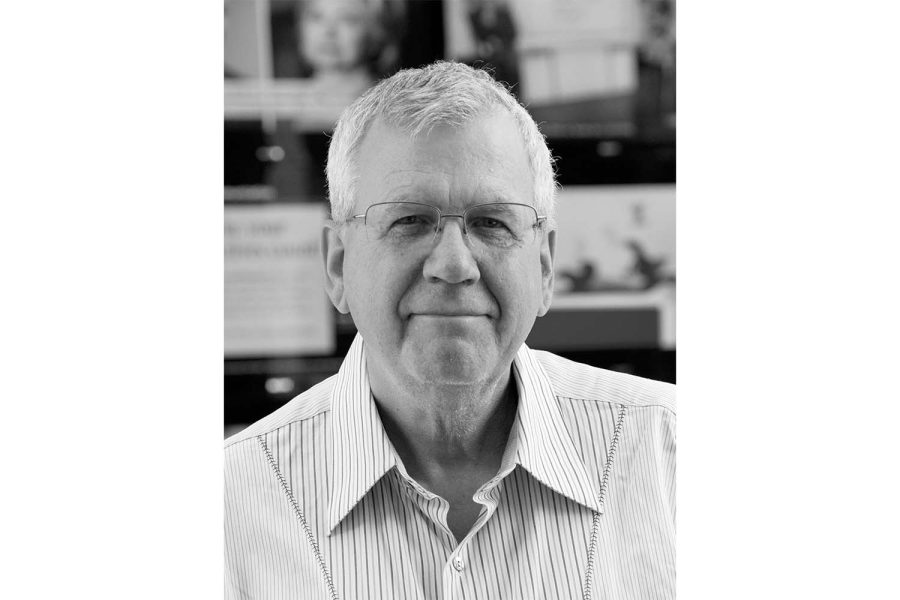Ask the Author | Don McLeese
Don McLeese is a professor of journalism at the University of Iowa, an editor, and an author who discussed his latest book “Slippery Steps : Rolling and Tumbling Toward Sobriety,” in this week’s Ask the Author — which records his journey to sobriety and offers insight into literature and life.
Contributed photo Don McLeese.
October 11, 2022
Don McLeese is an University of Iowa professor of journalism, an author, and an editor. Before joining the faculty at the UI, McLeese was a prominent award-winning music journalist, having written for periodicals like the Chicago Sun Times and the New York Times Book Review. Currently, he serves on the editorial advisory boards of three different institutions including the University of Iowa Press. He has written three books so far; his most recent, “Slippery Steps: Rolling and Tumbling Toward Sobriety,” was released Oct. 8 during the Iowa City UNESCO City of Literature Book Festival. He wrote the book to understand his drinking problem and his path to sobriety, and he hopes the book will provide answers for people who — as he was — are unsure of whether they are “alcoholic enough” to seek recovery.
The Daily Iowan: The book is both a memoir of your recovery process but also a reflection on life. How did you approach the form of such a book and ensure your message was clearly conveyed?
Don McLeese: I know enough about writing to know that I had to structure the book with something pretty grabby and pretty immediate. To me, that incident at the start of the book is kind of what splits the story into before and after. Before, there is all this, and after, there is sobriety. So, that’s where it started, and then I had to play around a little with how much of that going to meetings kind of tiptoeing my way to sobriety I wanted to have before the second part of the book, which is going all the way back and telling my life. I couldn’t start with that part of the book because nobody cares how I was as a baby. What I got to get them interested in is the drama of getting sober. This was one of the major challenges because it’s not just a conventional memoir. I didn’t want to write a memoir. I really wanted to write for somebody a book that I thought might have benefited me when I was in that position of trying to figure out whether I had a drinking problem.
DI: The book mentions the importance of being honest about oneself in order to recover. How do you think writers can overcome embarrassment about their flaws and write about their true selves?
McLeese: It is really hard to be the judge of how honest we are with ourselves because we are the ones who are doing it, and we are the ones who are judging it. A lot of this gets wrapped up in my recovery as well, because I thought I was being honest with myself through decades of drinking. I did not think I had a drinking problem. I would be defensive about it. I would be in denial about it. I thought what worked for me was drinking myself to sleep every night as long as it didn’t interfere with the work in the morning. It’s only after the fact that I can see how much in denial I had been, how much rationalizing I had been doing. I could be a very lenient judge with myself. I could make the rules. I could say, “Well, I’ll only have one drink tonight.” After that, I could say, “Well, I’ll have another one.” I could change them as I had made the rules. It’s hard to be really honest with yourself about yourself.
DI: As creative writers, we are often told to not write about our lives and avoid morals for stories because those things do not greatly entertain the audience. But your book, despite being a memoir and despite having a powerful message, is very enjoyable. How did you manage that?
RELATED: Ask the Author | Rebecca Solnit
McLeese: Often when I’m teaching writing, I talk about establishing tone as making friends, trying to be an interesting person that others would be interested in. Trying to have conversations with them rather than talking down to them. I try to establish a conversational tone and a tone that has some humor to it that doesn’t take myself too seriously or life’s troubles too seriously or whatever, and I try to be engaging. I think what we all do as writers is craft a persona on the page, and that persona on the page might only be a small part of who you are. It’s the part of you that you want to present to the outside world. And if you can make that coherent and consistent and engaging, and if the reader feels like you’re not hiding something, the reader ends up developing an intimacy with the book. In general, readers can spot a phony. They can spot when you’re trying too hard to impress. I really dislike overwriting. I dislike big words when a smaller one is better. I dislike long sentences and paragraphs that test the reader’s patience when reading them. I strive for readability. I strive for a simplicity that is not simple-minded, but clarity. A metaphor that I and other writers use for writing is that “you have a garden with weeds and flowers; get the weeds out of there because the flowers are going to present themselves all the better without being surrounded by all that junk.”














